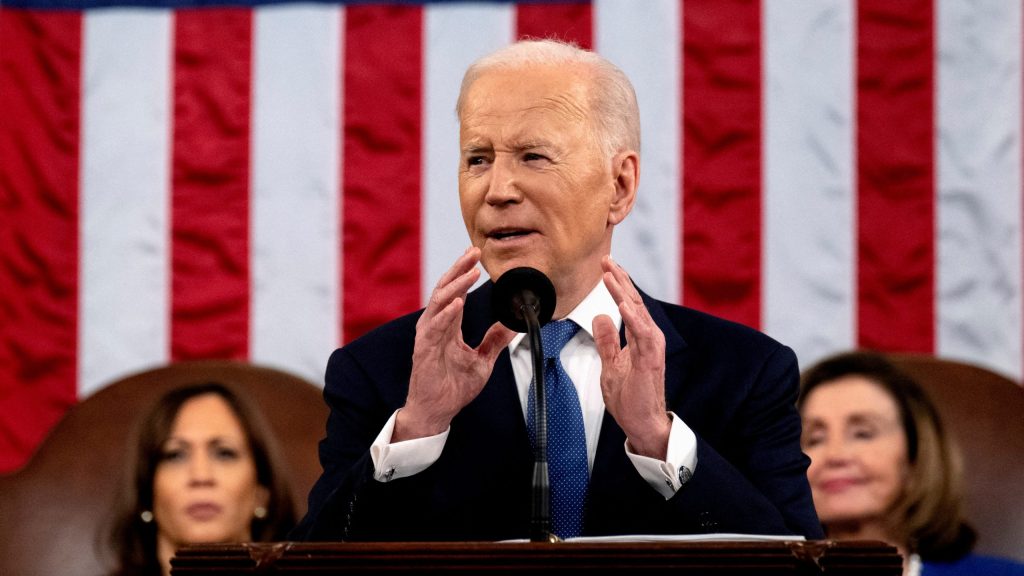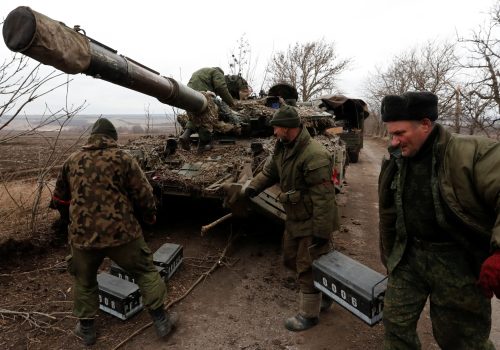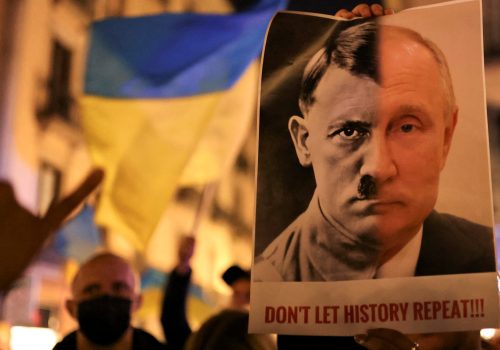Against the backdrop of Russia’s war in Ukraine and rising inflation at home, US President Joe Biden delivered his first State of the Union address Tuesday night—a speech closely scrutinized from Washington to Moscow. Our experts were watching, too, so we asked them about the key questions raised by his hour-long address:
Broadly speaking, what will you remember from Tuesday night’s speech?
This was the first State of the Union address since the Cold War that was given while Russian military forces were conducting a large-scale attack on another country. Biden couched the united stand among the world’s leading democracies as part and parcel of the global ideological competition against autocracies. But perhaps the most important point he made was that autocrats’ appetites grow when their aggression is not effectively confronted. Biden is right that appeasing dictators does not work; Russian President Vladimir Putin’s aim is nothing short of restoration of the old Soviet empire, as well as pushing as far west, north, and south in Europe as he can to expand his own direct dominion and control. He will not stop at Ukraine if he is successful—but if he is hemmed in by a resolute West supporting Ukraine’s defense, there is a chance that he can be contained. Moreover, his Chinese autocratic counterpart, Xi Jinping, is watching closely for lessons he can learn vis-à-vis his desire to forcibly take over democratic Taiwan. This year will be remembered as a historic one for determining the future course of these contests.
—Barry Pavel, senior vice president and director of the Scowcroft Center for Strategy and Security
It was notable that foreign policy led a State of the Union address; it has been a long time since that was the case, but the situation in Ukraine clearly called for such a response. And it clearly pushed any other foreign-policy topic out of the speech, since the president barely mentioned China, for example. For the moment, at least, the administration’s foreign-policy focus has shifted back to Europe.
—Emma Ashford, resident senior fellow with the New American Engagement Initiative in the Scowcroft Center
What I will remember most is that economic sanctions led the speech and the discussion of COVID-19 came an entire forty-five minutes into the speech. If you’d told me that one month ago, I’d have been very skeptical.
—Josh Lipsky, director of the GeoEconomics Center
The president made news by announcing that the United States would close off American airspace to all Russian flights. What impact will this have?
I’m not sure this is the right move. It will make it more costly for many long-range flights to operate around the world, particularly as Russia has itself begun to bar flights from various Western countries. Many trips between Europe, the United States, and Asia will now be forced to take longer routings, costing more in fuel and time.
—Emma Ashford
This is another, if small, piece of the ongoing “comprehensive decoupling” that the United States and its transatlantic allies and partners are establishing to isolate and contain Putin. Alone, this measure would not appear to be significant, but it builds the overall edifice higher for keeping new Russian expansionism in check.
—Barry Pavel
Biden reaffirmed that US forces “will not engage in conflict with Russian forces in Ukraine”—but also that he’s sending more troops to defend “every single inch” of NATO territory. Is that still the right line to take?
While the president reaffirmed current US and allied policies regarding the Russian invasion, his speech might have been more effective if he had made the case much more strongly, much more clearly, and in much greater detail, to the American people. They need to know what’s at stake—that we could be in this for the long haul, what the downside risks are if we don’t remain resolute and united with our allies, and what might lie ahead. Additionally, in the near term, as horrific images of thousands of innocent Ukrainian civilians being shelled by assaulting Russian forces appear on our screens in the coming weeks, the pressure on the United States and NATO to do more will grow exponentially. And the president will need to calibrate those imperatives with the significant, historic risks of igniting World War III.
—Barry Pavel
This is perhaps the most important remark that Biden made in this speech (and that he has made in previous remarks on the war in Ukraine). While he made clear that the United States and Europe are both supporting Ukraine in a variety of ways, the United States must be extremely clear about the limits of that support. Direct military support to Ukraine risks elevating the war to a broader NATO-Russia conflict, which is an outcome that no one wants. By retaining the military options for the defense of its treaty allies, the United States increases its ability to deter any attacks on NATO member states while avoiding escalation here.
—Emma Ashford
Biden didn’t mention his Build Back Better plan by name, and instead laid out a plan to tamp down inflation. What do you make of his shifting economic priorities?
While the plan wasn’t mentioned by name, its main pillars are still there: health care, child care, and climate change. What the president was trying to do is frame these plans as a way to fight what he acknowledges is now his number-one concern: inflation. That’s the tricky tightrope he was trying to walk in the speech. The United States has recovered faster from the pandemic than any other Group of Seven (G7) economy:
But the flip side of that growth is high inflation, both here and around the world. Now, the invasion of Ukraine raises the possibility of higher gas prices and even more inflation pressures. To me, China actually receded from this speech compared to past economic speeches. With Putin’s aggression dominating the international front, the competition with China framing didn’t have the same bite.
—Josh Lipsky
Biden proposed to fight inflation in part by manufacturing more in America. Would such a move be effective, and what will it take to get that done?
What Biden is proposing is called modern supply-side economics, and the idea is that instead of focusing on tax policy, you need to raise the productive capacity of the country. Or in English: Make more stuff. But the United States doesn’t have the industrial capability today to do what is being imagined. Can we get there? Sure, but not alone. It could be effective if done with allies. And we do need to redesign supply chains and put critical products like semiconductors and personal protective equipment closer to home. National Economic Council Director Brian Deese came to the Atlantic Council last summer to announce the administration’s Buy America plan—and made clear it was not about America doing it alone. Biden didn’t specify that Tuesday night, but he should in the days ahead. That’s an important message to send to countries that just jumped in head-first with the United States on sweeping financial sanctions.
—Josh Lipsky
The idea of manufacturing in America as a hedge against inflation is confusing. After all, as a highly developed economy, there are many products that would be expensive to produce in the United States and far cheaper to produce overseas. Perhaps there are security reasons to consider promoting domestic production in some industries, such as semiconductors, but it is hard to justify in most cases. Indeed, pushing to re-shore production of many products is liable to increase, not decrease prices in the long run.
—Emma Ashford
Further reading
Sun, Feb 27, 2022
Ukraine has finally prompted the West to shift course on Putin
Inflection Points By Frederick Kempe
The Zelenskyy delegation’s chance to succeed in talks at the Belarus border with a Russian delegation would be far greater if Putin were confident that the West has Ukraine’s back.
Tue, Mar 1, 2022
Four ways the war in Ukraine might end
New Atlanticist By Barry Pavel, Peter Engelke, Jeffrey Cimmino
The United States, its transatlantic allies and partners, and the entire world face a difficult period of sustained contestation with Russia.
Sun, Feb 27, 2022
Ukraine War: Vladimir Putin has gambled everything and lost
UkraineAlert By
Putin has gambled and lost. Ukrainians will suffer terribly from his criminal invasion, but they will survive and emerge as a strong, modern nation. Putin faces a far more uncertain future following this senseless war.
Image: US President Joe Biden delivers the State of the Union address to a joint session of Congress at the U.S. Capitol in Washington, DC, U.S, March 1, 2022. Photo by Saul Loeb/Pool via REUTERS



